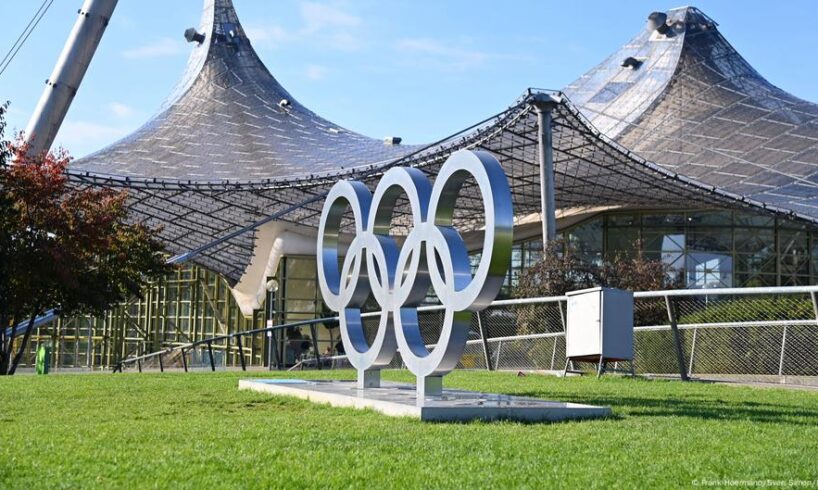
Germany’s aspirations to host another Olympic Games are set to face their first major hurdle. On Sunday, October 26, Munich residents are to go to the polls to vote on whether their city should bid to host the Summer Olympics for the first time since 1972. This would also include hosting the Paralympics.
Not only Munich, but also Berlin, Hamburg, and the Rhine-Ruhr region are all hoping to host the Games. DW answers the key questions about Munich’s Olympic referendum.
Who is eligible to vote?
All European Union citizens who have had Munich as their primary residence for at least two months and will be at least 18 years old on October 26, 2025 – a total of about 1.1 million people – will be eligible to vote. A turnout of 10% is required for the result of the referendum to be deemed valid.
The question the voters are being asked is: “Are you in favor of the [Bavarian] state capital Munich bidding for the Summer Olympic and Paralympic Games, to be held either in 2036, 2040, or 2044?”
What is the expected outcome?
It’s difficult to predict. A survey conducted by market research company YouGov for the DPA news agency, 48% of respondents stated that they were “somewhat” (27%) or “completely” (21%) in favor of Munich’s Olympic bid. 32% were either completely (18%) or somewhat (14%) opposed. Around one in five (21%) expressed no preference.
What are the arguments in favor?
The organizers of the Munich Olympics campaign are billing them as “Games with Heart and Soul” – a sustainable Olympic Games within a limited area. Ninety percent of the planned sports venues would be located less than 30 kilometers from the planned Olympic Village in the northeast of the city. Only the sailing, football, canoeing, and mountain biking competitions would require farther travel.
Former Bayern Munich manager Uli Hoeness (second from left) is among the prominent supporters of the bidImage: Frank Hoermann/Sven Simon/IMAGO
Most of the competition venues already exist. Others would have to be renovated or expanded, and only a few need to be built from scratch. Supporters believe hosting the Games in Munich would have positive effects on the economy, housing, infrastructure, the mood in the city and Germany’s image worldwide.
What do the opponents say?
They argue that hosting the Olympic Games would be too expensive. Experts from the Technical University of Munich estimate the cost to be between €18 and €21 billion ($21 and $24 billion).
Critics warn of uncertainties that could lead to even higher costs – for example, if, as was the case with the 2024 Games in Paris, extensive security measures would have to be financed due to a heightened political atmosphere.
They also fear that if the city were to be awarded the right to host the Olympics, housing prices and the cost of living would rise. There are also environmental concerns, particularly if, as planned, a mountain bike course were to be built in the Tegernsee region south of Munich.
What impact will the referendum have?
“If it doesn’t work here, then it probably won’t work anywhere else either,” Bavarian state Premier Markus Söder has said, referring to the other candidates looking to launch a German Olympic bid.
Ulrike Meyfarth won gold in the high jump, giving hosts West Germany one of their six gold medals at the 1972 Munich Games.Image: picture-alliance / Sven Simon
If Munich’s residents vote in favor of bidding for the Olympics, the International Olympic Committee could also interpret this as a strong indicator of the general mood in Germany regarding the Olympics.
“A positive outcome of the referendum in Munich would of course give our bid campaign a boost,” Thomas Weikert, President of the German Olympic Sports Confederation (DOSB) has said.
What happens next?
Even if Munich votes against the Olympic bid, the DOSB intends to stick to its plan to bring the Games to Germany in 2036, 2040, or 2044.
The other candidates, Hamburg and Rhine-Ruhr, as well as Kiel as a potential host for the sailing competitions, are also planning to hold referendums. In Hamburg, the senate has set the Olympic referendum for May 31, 2026. In Kiel, citizens are to cast their ballots on April 19 next year, which is the same date as the organizers of the Rhine-Ruhr Olympic bid expect.
As Berlin’s state constitution does not provide for a referendum on the Olympics in the capital city, a petition is to be launched in favor of bidding for the Games.
The DOSB plans to decide which bid it will put forward to host the Olympic Games by the autumn of 2026 at the latest. The IOC has not yet announced when it plans to award the rights to host the 2036, 2040 and 2044 Games.
This article was originally published in German.
Edited by: Jonathan Harding





